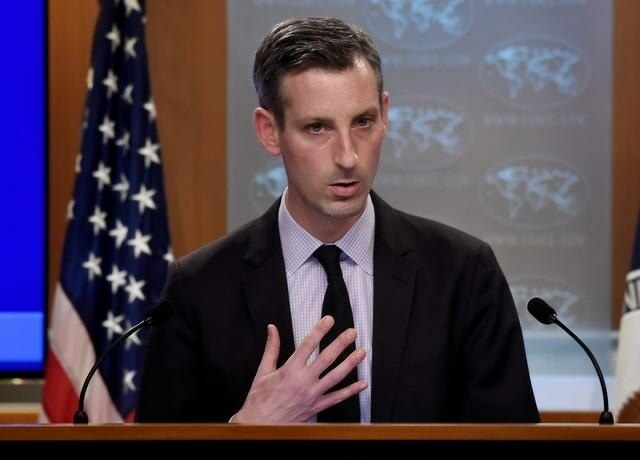State Department Press Briefing July 20, 2022

State Department Spokesperson, Ned Price held a press briefing on July 20, 2022.

State Department Spokesperson, Ned Price held a press briefing on July 20, 2022..
He fielded questions on a wide range of subjects from Ukraine war, Nord Stream, and Syria, to Turkey, Russia, Iran, Lebanon, and Brazil besides energy concerns.
EXCERPTS
MR PRICE: Just one element at the top and then we’ll turn to your questions. As I think you all know, the European Council extended Georgia a European prospective status, along with a roadmap of reforms that must be implemented for Georgia to achieve full candidate status. We know the people of Georgia are overwhelmingly in favor of joining the EU, and we, of course, support those aspirations.
The rhetoric from some Georgian officials recently, however, seems intended to distract Georgia’s citizens from that goal. Ambassador Degnan and her team at our embassy in Tbilisi are committed to working with the people of Georgia in support of their Euro-Atlantic aspirations. Ambassador Degnan has our full support. Disinformation and personal attacks on Ambassador Degnan or her team are not consistent with how partners communicate with one another, and we will continue to focus on supporting our shared goals. We have worked shoulder to shoulder for 30 years on democratic reforms, economic development, and security cooperation. This remains unchanged.
Today the United States is working with our allies and partners to bring an end to President Putin’s war in Ukraine as quickly as possible and to secure a peaceful future for the entire region. The United States supports Georgia’s sovereignty and its territorial integrity within its internationally recognized borders, and we continue to support peaceful efforts to end Russia’s occupation of 20 percent of Georgia’s territory.
With that, happy to take your questions.
QUESTION: Ned, I’m sure you’ve seen Russian Foreign Minister Sergey Lavrov’s comments. He basically said today Moscow’s military tasks in Ukraine now went beyond the eastern Donbas region. What is your take on that?
MR PRICE: I think you hit the nail on the head. …This morning Foreign Minister Lavrov essentially confirmed the warning that we put forward yesterday, the warning that Ambassador Carpenter put forward in May, and that you have consistently heard from us. Foreign Minister Lavrov said, quote, Russia’s, quote, “geographical goals” in Ukraine include not just the Donbas but also Kherson, Zaporizhzhia, and other territory inside Ukraine.
These comments to us only further demonstrate that Russia is moving toward the annexation that we’ve warned about, and they serve as a reminder of the ultimate purpose and objective of Russia’s illegal, unjustified war against Ukraine. … Again, we have been clear that annexation by force would be a gross violation of the UN Charter, and we would not allow it to go unchallenged. We would not allow it to go unpunished. ….
QUESTION: Just a second ago you said the U.S. would not allow annexation to go unchallenged, to go unpunished. Do you guys have a set of new sanctions or, like, a specific action that you are preparing for when this would happen?
MR PRICE: We are not, of course, going to forecast our specific punches, but I will reiterate that we will not let this go unchallenged. We will work with the international community to respond very clearly and decisively to any Russian effort to go ahead with this territorial annexation. It would be a gross affront to the UN Charter; it would be a gross affront to the international law. And the principle that has always been at play is that every time one of the key tenets of the rules-based international order is undermined anywhere, the rules-based international order is undermined everywhere. And so, we will continue to do everything we can, including pulling on the authorities we have, to respond to any such effort.
QUESTION: Okay. Well, then that also raises the question of how Iran, which is under a significant amount of sanctions, even more than Russia – how are they able to do it?
MR PRICE: How are they able to – excuse me?
QUESTION: How are they able to build these drones?
MR PRICE: Well,
QUESTION: Iran is under more sanctions than Russia is now. Right?
MR PRICE: They are under – certainly under heavy sanctions pressure. But I think one of the distinguishing features of our campaign against Russia, our effort to hold Russia to account, has been our unprecedented use of export controls, our ability and the success we have had in limiting those raw inputs that can go into Russia’s defense industrial base. I think export controls have proven themselves in this context to be one of the most effective tools that we have, and these are tools that, lucky for us, we can wield in other contexts as well as appropriate.
QUESTION: I just wanted to ask about natural gas. Putin said that maybe they would get Nord Stream 1 back up after its scheduled maintenance, but that sanctions might have an effect where they wouldn’t be able to continue supplying gas. Meanwhile, the European Union warned today that they might have to ask countries to cut gas consumption by 15 percent, even reducing heat and air conditioning in public buildings. So, I’m wondering, is the U.S. doing anything to support Europe’s energy needs? Does it have any advice for them? And what do you think Putin will end up doing with the gas? I know Nord Stream 1 isn’t Nord Stream 2, so I’m not sure that the U.S. opposes that one.
MR PRICE: Well, unfortunately, President Putin has a track record when it comes to the supply of natural gas to Europe, and that track record gives us great concern. It’s why we have consistently warned of Russia’s ability and, in the past, its willingness to weaponize the export of energy. This is something that we started working on well before February 24th precisely because we were cognizant of that track record, as were our partners and as are our partners in Europe.
When it comes to our partners in Europe, we are united with them in our commitment to promoting European energy security, reducing our collective dependence on Russian energy, and maintaining pressure on the Kremlin. In – there is – this is both a short-term challenge, but also a longer-term challenge as well. In the short term, resumed gas flows will help allow Germany and other European countries to replenish their gas reserves, increasing their energy security and resiliency. You probably saw just a few days ago now we welcome the decision on the part of our Canadian ally to return a turbine to Germany as part of an effort to replenish those reserves in the short term.
Also in the short term, we have worked over the course of months now with countries around the world, in some cases as far afield as the Indo-Pacific, where our Japanese allies have been in a position to surge LNG supplies from the Indo-Pacific to the European theatre. We are continuing to work with our European allies for short-term options that will help them get through this near-term period.
But we’re also looking at this over the longer term, and that’s precisely why, when he met with President von der Leyen, last year, President Biden together with our European allies, we launched the U.S.-EU energy task force. They are looking at options and concrete ways that in the coming months, but really over the coming years, we can attack this structural challenge, and the structural challenge being that Europe for many years has had dependence on Russian energy supplies. Russia has, over the course of too long, proven itself not to be a reliable supplier of energy. So this is about reducing our collective dependence on Russian energy supplies, reducing our collective dependence on fossil fuels more broadly, too. That’s a challenge that will take quite some time, but it’s one that we’re committed to working jointly with our European allies.
QUESTION: Let me follow up. Are you concerned that this will affect the West’s unity in confronting Russia?
MR PRICE: This alliance, this coalition of countries that defies any one geographic region has proven its resilience, and it has proven its strength time and again. There have been many premature obituaries written for this incredible collection of countries in Europe and well beyond, dozens of countries that have come together to hold Russia to account, to support our Ukrainian partners, and to redouble our efforts to reinforce the rules-based international order. It was before February 24th where there were doubts about the viability of the international community to stand up. Since then, we’ve heard the same. But consistently since then at every opportunity – whether that’s been at the NATO summit, whether that’s been at the G7, whether that’s been at the G20 in its various iterations in recent weeks – we have seen the international community remain strong, strong in support of Ukraine, strong in our efforts to hold President Putin to account.
QUESTION: Ned, I have two questions – one, Russia and Korea. Recently something – Russia has announced that it will send North Koreans workers to do reconstruction Donbas, Ukraine. Do you think Russia’s use of North Korean workers violation of UN Security Council sanctions against North Korea?
MR PRICE: I couldn’t speak to specific UN Security Council sanctions, but it certainly is an affront to the sovereignty of Ukraine. The Donbas, eastern Ukraine, belongs to Ukraine and Ukraine alone. Decisions about who should be there, decisions about projects that should be ongoing there – those are decisions for the Ukrainian Government, not for any other government.
QUESTION: I see, thank you. And I have another one for Seoul, South Korea. Treasury Secretary Janet Yellen recently visited South Korea and met with South Korean President Yoon Suk-yeol. They discussed various issues such as economic security alliances. Also, Secretary Yellen said there were more sanctions to put pressure on North Korea. What are the specific sanctions? Does that include the secondary boycotts?
MR PRICE: So, Secretary Yellen was recently – she did recently have a meeting with Deputy Prime Minister and Minister of the Economy and Finance Choo Kyung-ho. They – she did speak extensively to our efforts – well, first, she, of course, spoke about the close alliance between the United States and our ROK allies. She at some length discussed the friendship and the alliance and the partnership between the American people and the Korean people that has been guided by shared values and shared interests over the course of decades now. She talked about the pivotal role that the ROK economy plays in the world. I believe she made the point that the ROK economy is the world’s tenth-largest economy, a producer of high-tech goods that are subject to import not only by the United States but by countries around the world.
She did also talk about our joint efforts to hold Russia to account. They discussed exploring a price cap on Russian oil to deprive Russia of the revenues – of the oil revenues that President Putin would otherwise receive in his coffers. They discussed broader measures that together we have taken and that potentially remain on the table should Russia not change course in its war of aggression against Ukraine. This is something that we will continue to have an opportunity to discuss with our Korean partners at various international for a, including the G20 and elsewhere, and I’m sure we’ll continue those.
QUESTION: The Wall Street Journal yesterday reported that – well, they were citing State Department officials – reported that the Secretary was expected to talk about energy and reducing energy dependence from unreliable countries due to this ministerial. I’ve seen the opening statement, but can you confirm that that’s, in fact, the Secretary’s position that we should not rely on unreliable countries?
MR PRICE: It is absolutely the position of the Secretary and of this administration that we need to lessen our dependence on energy supplies from countries like Russia that have proven themselves unreliable and then, in the case of Russia, has weaponized energy over the course of years now. This is about finding dependent, reliable, resilient sources of energy as we’re in the midst of the transformation broadly away from fossil fuels. But again, this is a transition period, and in the midst of this transition period, it’s our collective goal to lessen our dependence on Russian energy precisely because Russia has proven unreliable.
QUESTION: If you’re sitting in Azerbaijan or Saudi Arabia, you see Western leaders are coming and striking deals on energy without mentioning human rights. Well, this doesn’t sound like ingredients for long-term energy independence.
MR PRICE: Well, I can speak to the United States. In every one of our interactions with world leaders around the world, we put human rights at the center of our agenda. That’s the case. That was the case when the President travelled to the Middle East. It’s the case more broadly when the President travels around the world, when the Secretary travels around the world and has those discussions.
QUESTION: I’ve got a question about Syria. So today, this morning, the Turkish president said that American forces on the east of the Euphrates River should immediately withdraw from the area and that – and cross-border military operation is imminent and always on the agenda. … So, if the Turkish military was to launch another offensive, would you be supporting your NATO Ally, or what’s your position going to be on that?
MR PRICE: We’ve made our position on this clear for some time ever since talk of this first began. We remain deeply concerned about discussions of potential increased military activity in northern Syria, and in particular the implications it would have for the civilian population there. We continue to support the maintenance of existing ceasefire lines. We condemn any escalation that would change that. It is crucial, we believe, for all sides to maintain and respect ceasefire zones, to enhance stability in Syria towards a political solution to this conflict. You raised the 2019 agreement. It is our expectation that Turkey live up to that joint statement, including the commitment it made to halt offensive operations in northeast Syria.
Any new offensive would further undermine regional stability and put at risk U.S. forces and the coalition’s campaigns – campaign against ISIS. We have achieved tremendous progress, taking on the so-called caliphate that ISIS or Daesh has – had expanded in previous years. That would stand to be at risk. It would also stand to put at risk the broader political process that the United States – of which the United States is supportive, consistent with UN Security Council Resolution 2254.
QUESTION: If I could follow up on that, so you said that you’re expecting the Turks to live up to that agreement. But the Turks are feeling a little bit let down by the Americans because, obviously, some of the conditions in that agreement did not come to fruition. So, do you have any plans, if at all, to remove those Turkish concerns about how those YPG elements are still in that 30-kilometer zone in northern Syria?
MR PRICE: We understand Turkey’s security concerns. We know that Turkey, more so than any other NATO Ally, has been subjected to terrorist attacks. Turkey is a close security and defense partner of the United States. That is why we want to continue to work closely with the Turks to see to it that we don’t jeopardize the progress that has been made in Syria by the coalition. We want to see to it that ISIS isn’t given a reprieve. We want to see to it that the progress that has been achieved isn’t put at risk.
QUESTION: Do you have any comment on the Tehran summit that included Russia, Turkey, and Iran on Syria?
MR PRICE: Well, we’ll let these countries speak for themselves. A couple broader points, though. The fact that President Putin has had to travel to Iran, I think, speaks to the isolation that Russia – in which Russia finds itself as a result of its illegal, unjustified, unprovoked war against Ukraine. The fact that President Putin would need to run into the arms of one of the most heavily sanctioned, one of the most isolated countries in the world, I think, speaks to the dire straits Moscow currently finds itself in.
You heard from my White House colleague yesterday that President Putin’s interest in purchasing these UAVs from Iran, again, as I alluded to earlier, that to us is a clear sign that the measures we have undertaken against Russia are working – in this case, the export controls that are depriving Russia of the raw materials it would need for its defense industrial base, for its technological base, are working. It’s a sign that Moscow cannot indigenously produce the types of equipment that it feels it needs in Ukraine, because we are systematically starving them of the input it would otherwise need.
When it comes to what we heard between President Putin and the supreme leader, President Raisi – it was, in many ways, I think, striking to hear the supreme leader, in really no uncertain terms, essentially endorsing President Putin’s brutal invasion of Ukraine. And it was especially striking because Iran all this time had attempted to maintain a veil of neutrality, had said that – essentially that it was opposed to the war. It’s now clear that was entirely hollow. Iran has now cast its lot with a small number of countries who wore that veil of neutrality only to end up supporting President Putin in his war against Ukraine and the Ukrainian people.
QUESTION: I have two more on Lebanon, Ned. First, is there any plan for Special Envoy Hochstein to go to Lebanon or Israel to push forward the talks between the two countries on the maritime borders?
MR PRICE: We haven’t announced any travel for Amos Hochstein. Of course, he was in Lebanon, he was in Israel just within the past few weeks. We released a statement in the aftermath of his most recent travel, noting that he will continue to work with the two countries, both parties, that we welcome the constructive dialogue, we welcome the progress that has been achieved, and we’ll do everything we can – he in that capacity will do everything he can – to support that and to move it forward.
QUESTION: And on the internal situation, the institutions, the government institutions are collapsing. The formation of a new government is stalled. Is the U.S. trying to do anything to push the process forward?
MR PRICE: We are. We’ve been in regular contact with our Lebanese partners. We’ve urged Lebanese stakeholders to form a government capable of and committed to implementing reforms and restoring the trust of the Lebanese people. We call on Lebanese leaders to act seriously and urgently to implement reforms and take the necessary actions to rescue Lebanon’s economy, including actions that can be taken during this current period of government formation.
QUESTION: The U.S.-Japan economic 2+2 ministerial meeting will be held next week. Can we expect any announcements of a new sanction against Russia will come out?
MR PRICE: I don’t know that we’ve formally announced this yet, so I will be reserved in my comments. I’m sure we’ll have an opportunity to speak to it as next week approaches, but what I can say is that we have had a number of opportunities, including at the highest levels, to engage our Japanese allies. President Biden, of course, was in Tokyo in May. We had an opportunity to see Foreign Minister Hayashi in Bali earlier this month. Of course, we then had an unexpected and somber occasion to visit Tokyo just after our travel to Bali, where we again saw the foreign minister engaged with the prime minister.
QUESTION: Thank you, Ned. In the beginning of the briefing, you said the rules-based international order, undermined anywhere it’s undermined everywhere. Does that also apply to Turkish violation of the sovereignty of its neighbors? Just this morning Turkey bombed a civilian tourist site, killing eight Iraqi tourists and wounding over 20. Are you, first, aware of those reports? And if you’re not, are you generally concerned about Turkish repetitive violation of the sovereignty of its neighbors?
MR PRICE: I am aware of those reports. I do expect we’ll have more to say on this later today, but let me just say in the interim that we’re aware of the deadly shelling in northern Iraq today. It killed and injured numerous Iraqis, including civilians, according to these first reports. We reaffirm our position that military action in Iraq should respect Iraqi sovereignty and territorial integrity, and we express our condolences to the families of the victims of today’s actions. We emphasize the importance of ensuring civilians are protected and we will continue to monitor the situation closely as additional information emerges. For the time being, we’ll defer to our Iraqi partners for additional comment.
But to your broader question, the rules-based international order is agnostic as to the country behind it, and it applies equally to the United States as it does to any other country, whether that’s in the Middle East, in Europe, in the Indo-Pacific, in any other region around the world.
QUESTION: Thanks. Just changing to another part of the world, past Monday, a group of ambassadors and other diplomats, including a U.S. diplomat, they were invited to attend a meeting with the Brazilian president who, at that occasion, raised questions about the electronic voting system in Brazil. Which feedback did State Department receive from the U.S. embassy in Brazil regarding this matter? Could you address this matter?
MR PRICE: I can address the matter broadly, and at the broadest level, this is something we’ve spoken to since last year. We’ve spoken to this privately with senior Brazilian officials, but we’ve also made our views known publicly as well. And our view is that elections have been conducted by Brazil’s capable and time-tested electoral system and democratic institutions successfully over the course of many years. It serves as a model for nations not only in the hemisphere, but also beyond as well. As a partner, as a democratic partner to Brazil, we’ll follow the October elections with great interest and with the full expectation that they’ll be conducted in a free, fair, and credible manner with all relevant institutions conducting their constitutional role.
……………
-
Book Shelf
-
 Book Review
DESTINY OF A DYSFUNCTIONAL NUCLEAR STATE
Book Review
DESTINY OF A DYSFUNCTIONAL NUCLEAR STATE
- Book ReviewChina FO Presser Where is the fountainhead of jihad?
- Book ReviewNews Pak Syndrome bedevils Indo-Bangla ties
- Book Review Understanding Vedic Equality….: Book Review
- Book Review Buddhism Made Easy: Book Review
- Book ReviewNews Elegant Summary Of Krishnamurti’s teachings
- Book Review Review: Perspectives: The Timeless Way of Wisdom
- Book ReviewNews Rituals too a world of Rhythm
- Book Review Marx After Marxism
- Book Review John Updike’s Terrorist – a review
-
-
Recent Top Post
-
 NewsTop Story
Pope Francis dies: an unconventional pontiff who sought to modernise Catholicism
NewsTop Story
Pope Francis dies: an unconventional pontiff who sought to modernise Catholicism
-
 CommentariesTop Story
India’s Migration Dilemma
CommentariesTop Story
India’s Migration Dilemma
-
 Commentaries
Crowd Management Blues
Commentaries
Crowd Management Blues
-
 Meher Baba SpeaksNews
Meher Baba Loved Them Too…
Meher Baba SpeaksNews
Meher Baba Loved Them Too…
- Commentaries Record Pentagon spending bill and America’s hidden nuclear rearmament
-
 CommentariesNews
Ides of trade between India and Pakistan
CommentariesNews
Ides of trade between India and Pakistan
-
 Commentaries
How sustainable is the rhetoric of India-China Bhai-Bhai
Commentaries
How sustainable is the rhetoric of India-China Bhai-Bhai
-
 CommentariesTop Story
New Set of Diplomatic Strains with Canada
CommentariesTop Story
New Set of Diplomatic Strains with Canada
-
 News
Ratan Tata’s Legacy
News
Ratan Tata’s Legacy
-
 Commentaries
India’s Strategic Push on the World Stage
Commentaries
India’s Strategic Push on the World Stage
-
AdSense code

















